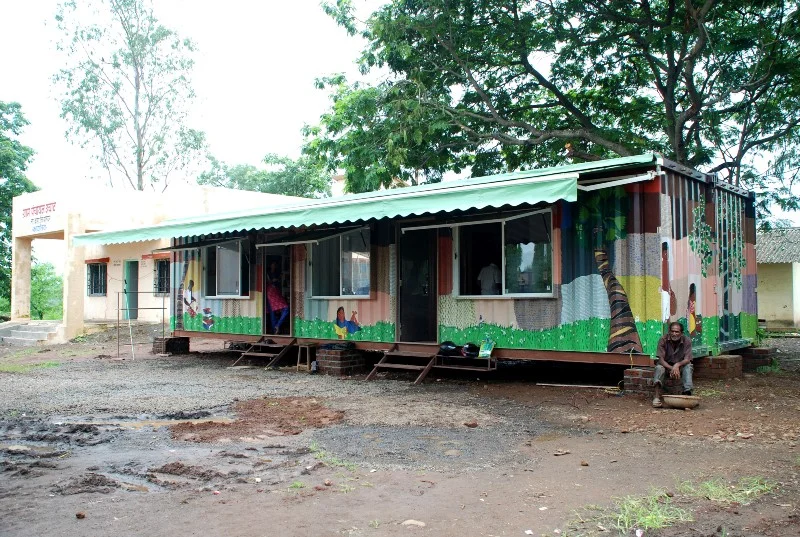Break Out Of The Mould On Your Next Vacation And Stay At The Eco-Friendly Cuckoo Hostel

Tucked away in a quiet by-lane, the Cuckoo Hostel calls out with its sunshine-yellow windows and chalk-white walls.
Rajat ‘Cuckoo’ Kukreja pulls away from the lockers he’s been sanding to show me around Bangalore’s newest travellers’ hostel where ‘reduce, reuse, recycle’ seems to be the leitmotif. There are low-slung beds and tables fashioned out of industrial packaging, a desk that was once a kitchen countertop and lockers hand-painted in pastels that hark back to my school days.
Kukreja is a trained journalist with years of experience in the development sector. As a Gandhi Fellow, he has also served in rural Central India, an experience that shaped his worldview today. He is training to be a musician and, as part of his day job as an entrepreneurship educator, works towards building the skills and capacities of rural businesses.
He tested the waters for several months before setting out to build Cuckoo Hostel. In his tiny flat in Bangalore, Kukreja hosted travellers from all over the world and continues to remain close friends with many of the people he met. He found these unique encounters immensely educative and began to appreciate the value of intimate, shared travel experiences far removed from the impersonal world of hotels and resorts. In June 2016, he left home with a fledgling idea and with all his worldly belongings packed into a single backpack. As the first occupant of Cuckoo Hostel, his experiment in living small helps him get into the shoes of his guests.
The space has had multiple influences, he says, but his appreciation for creativity and playfulness as a means of fostering learning and engendering communities stands out.
“I wanted to see things differently and find new uses for them rather than buy new stuff and contribute to the waste around me”, he says about the number of repurposed items to be found in the hostel.
Almost everything in the hostel has been designed and built by him, his assistant, Janak and a team of design students and volunteers. Many of the fixtures were thrifted from the city’s second hand markets and junkyards and given a new lease of life. “None of this furniture looked like this when we bought it”, he says, pointing at a colourful, refurbished bookshelf. Having built much of it himself has changed the way he relates to the space and has given everyone involved a sense of co-ownership over it. Nobody in the team had any prior experience with carpentry, painting or refurbishing but the firm focus on reusing as much as possible challenged them to experiment with innovative ways of designing and furnishing the space.
“Once people see how we have reimagined spaces and repurposed things, we hope it inspires them to go back and rethink their own ways of living”, he says about the hostel’s larger purpose.
Cuckoo Hostel draws inspiration from the Muria ghotuls, spaces where hierarchies were shunned and peer-to-peer learning and collective creation of knowledge encouraged. While they offer privacy, rooms in the hostel are designed to allow guests to interact and communicate with each other freely.
“As a guest you can use the vintage letter boxes on the wall to drop in requests for information and tips from fellow travellers or offer to share skills and knowledge with them. Guests can offer anything — baking lessons, tree walks, music workshops."
The 2 dormitories and the 3 private rooms are minimally furnished and amply lit by skylights. Large windows overlooking the tree-lined street ensure natural ventilation. A central, sound-proofed room with a bright, double-height ceiling is the common room, library and jam room. It also doubles as a learning centre where guests can attend workshops and skill-building classes. The room will soon be turned into an indoor jungle and its white brick walls will display murals by local artists. We go up to the terrace garden where old tyres skirt the edges, ready to be sowed with vegetables and greens to supply to the hostel kitchen. The hostel plans to be a zero-waste space, composting all its wet waste and recycling dry waste into useful products for guests. Kukreja is also collaborating with the local Residents’ Welfare Association to clean up public spaces in the area.
Guests can rent bicycles to explore the neighbourhood and are encouraged to patronise local businesses and restaurants in the city to help foster small entrepreneurs. On the cards are day-long outings to surrounding villages where guests can meet local communities and learn useful life skills.
Cuckoo Hostel opens for business this week. Rooms at the hostel cost between Rs. 350 and Rs. 700, inclusive of breakfast.
When you are in Bangalore next, give the cookie cutter hotels a miss and head to Cuckoo Hostel instead. Find them on Facebook here.
Maya is a social researcher by training. Her writing has appeared in Scroll, YourStory and The Alternative. She is the Founder of Eartha and tweets @Maya_Kilpadi.









